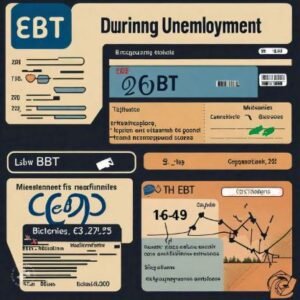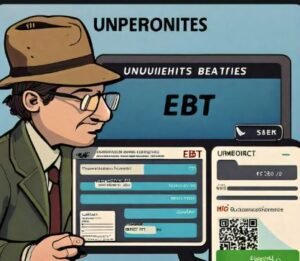When unemployment strikes, many individuals and families find themselves facing financial uncertainty. For those struggling to make ends meet, assistance programs like the Supplemental Nutrition Assistance Program (SNAP) can provide a crucial lifeline. The eligibility for EBT during unemployment is a common question for many who are out of work and in need of support. While SNAP benefits can be a helpful resource during tough times, the process of qualifying for EBT assistance can sometimes feel like a complicated struggle.
In this article, we will explore the question: “Is eligibility for EBT during unemployment a lifeline or a struggle to qualify?” We will break down the criteria, challenges, and opportunities associated with accessing EBT benefits while unemployed, and provide helpful information for those navigating this process.

What is EBT and How Does It Work?
Before delving into eligibility for EBT during unemployment, it’s important to understand what EBT (Electronic Benefit Transfer) is. EBT is the method by which SNAP benefits are distributed to eligible individuals and families. These benefits can be used to purchase food from authorized retailers, helping low-income individuals and households afford nutritious meals.
SNAP, often referred to as food stamps, is designed to support those in need, particularly when other financial resources are unavailable. For unemployed individuals, the ability to qualify for SNAP can be crucial, making the eligibility for EBT during unemployment a key concern.
Understanding Eligibility for EBT
Eligibility for SNAP benefits depends on various factors, including income, household size, and resources. The primary goal of the program is to ensure that individuals and families have access to the nutrition they need during difficult economic times.
To determine if you qualify for EBT during unemployment, the following factors are taken into consideration:
- Income: One of the most important eligibility factors is income. If you are unemployed, your household income may be reduced or nonexistent, which could make you eligible for SNAP benefits. However, there are income limits that vary by state, and the total household income must be below a certain threshold to qualify for assistance. For example, unemployment benefits you receive may count as income, which could affect your eligibility.
- Household Size: The size of your household will impact the amount of benefits you may receive. Larger households are typically eligible for higher benefit amounts. When considering eligibility for EBT during unemployment, it’s important to report all members of your household, including children, as this will affect your qualification and benefit amount.
- Resources: While income is the main factor in determining eligibility, the SNAP program also considers your household’s resources, such as savings, vehicles, and property. If your household has significant resources, it may be more difficult to qualify for EBT benefits during unemployment. However, in most cases, unemployment benefits alone will not push you over the resource limit.
- State Regulations: Each state administers its own SNAP program, and the rules for eligibility for EBT during unemployment can vary from state to state. Some states have more lenient eligibility requirements, while others may have stricter guidelines for unemployed individuals. It’s essential to check your state’s specific requirements when applying for EBT benefits.

The Process of Applying for EBT During Unemployment
If you find yourself unemployed and in need of food assistance, applying for SNAP benefits may be an important step. The application process can vary slightly by state, but the general process is similar across the country.
- Submit an Application: The first step in applying for EBT benefits is applying to your state’s SNAP office. This can usually be done online, in person, or by mail. The application will require you to provide detailed information about your household, including income, expenses, and resources.
- Eligibility Determination: After you submit your application, the state will review your eligibility based on the information you provide. If you are unemployed, your reduced income may make you more likely to qualify for benefits, but other factors, such as household size and available resources, will also be considered.
- Interview: Many states require an interview as part of the application process. This is typically done over the phone or in person and is an opportunity for the SNAP office to verify your information and ask additional questions. During the interview, be prepared to provide documentation of your unemployment benefits, household size, and other relevant information.
- Approval or Denial: Once your application and interview are complete, the state will issue a decision regarding your eligibility for EBT. If you are approved, you will receive your EBT card and can begin using it to purchase food. If you are denied, you may appeal the decision or seek additional assistance.
Challenges in Qualifying for EBT During Unemployment
While eligibility for EBT during unemployment can be a lifeline for many individuals, the process is not always simple, and several challenges may arise:
- Income Limits: Even though unemployment benefits are typically lower than full-time wages, they may still push you above the income threshold for SNAP eligibility in some states. For example, if you are receiving unemployment benefits but also have other income sources (such as a spouse’s earnings or rental income), it may limit your eligibility for EBT.
- Documentation Requirements: One common frustration for individuals applying for EBT during unemployment is the extensive documentation required. You will need to provide proof of your unemployment benefits, household expenses, and possibly other resources. Gathering all the necessary paperwork can be time-consuming, especially when you are already dealing with the stress of unemployment.
- State-Specific Rules: As mentioned earlier, eligibility criteria can vary by state. Some states have stricter guidelines, while others may offer additional assistance or more lenient requirements for unemployed individuals. Understanding the specific rules in your state can be confusing, especially if you have recently moved or are unfamiliar with the local regulations.
- Limited Benefits: While EBT during unemployment can provide relief, the amount of assistance you qualify for may not be sufficient to cover all your food needs. The benefits provided by SNAP are often designed to supplement a household’s food budget, not fully replace it, so unemployed individuals may still need to rely on other forms of assistance or food programs.
Is EBT During Unemployment a Lifeline or a Struggle to Qualify?
For many, eligibility for EBT during unemployment can indeed be a lifeline. If you are struggling to afford food during unemployment, SNAP benefits can ease the burden by helping you buy nutritious meals without depleting your savings. The ability to access EBT during periods of financial hardship can provide peace of mind and make a significant difference for individuals and families in need.
However, the process can also present significant challenges. Eligibility for EBT during unemployment can be a struggle due to income limits, state-specific rules, and the documentation required to complete the application. While the benefits are designed to assist low-income individuals, navigating the system and qualifying for assistance can be difficult and time-consuming.

Conclusion
Ultimately, eligibility for EBT during unemployment can be both a lifeline and a challenge, depending on your specific circumstances. For those who meet the eligibility requirements, SNAP benefits can provide crucial support in times of need. However, understanding the requirements, gathering the necessary documentation, and dealing with potential state-specific rules can make the process feel like a struggle.
If you are unemployed and considering applying for EBT benefits, it’s essential to fully understand the eligibility criteria in your state and be prepared for the application process. By staying informed and organized, you can increase your chances of successfully accessing the food assistance you need during difficult times.




